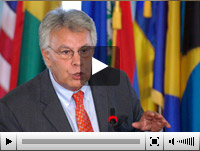- English
Lecture Series
Eighth Lecture - Felipe González
Eighth Lecture - September 13, 2005
"Challenges Confronting Latin America and the Caribbean"
Speaker:
Felipe González,
former President of Spain
Thank you Mr. Chairman and thank you everyone. Let me begin by saying that Alberto Rex said quote: “some of my colleagues have taken literally in their more than eighty years old and they still want to be in power. But that’s not what I was referring to.
I was saying that one should fight all one’s life but not remain in power all one’s life. I’d like to thank you for those kind words Mr. Chairman, Mr. Secretary General, and dear friend. Let me tell you one thing: I don’t lecture; I am very bored by lectures and therefore refuse to lecture and what is referred to in Spain as “lecciones magistrales.”
I’ve had ties with Latin America for over thirty years and for half that period I was President of my government. But I’ve been out of the presidency for nine years and at times, I tell anecdotes that explain what I mean. I’ve had more interviews on TV in Latin America than in Spain, between Venezuela and Mexico. When I was in office after having won by absolute majority, I had fewer minutes on TV to enter government than the amount of TV time I had between Venezuela and Mexico up until 1980.
I am one of those in Spain who believe (and there aren’t that many) that you can only understand Spain when you get to know LA. Many are surprised by this statement and there’s no other way of looking at Spain. As we see it, we don’t understand ourselves very well, what is this thing about Spain, what are the Spanish autonomies? Does Spain exist or not? Is it one nation or not? Only if you understand LA can you understand Spain. Thus, we do share something that is very serious, and it’s a problem of identity. And I thank you Mr. Chairman for your kind words. I’m not sure I deserve them. In fact, I think I don’t because when you say I’m concerned about the Middle East, which is true, and the problems of the world, I remember I said some years ago that the energy crisis was going to be a supply crisis. Incidents such as the Iraq conflict, the tension in Nigeria or the problems in Venezuela, etc. don’t really affect the substance of the problem. For the first time in the history of mankind, the current history of mankind, it seems obvious to me that we just don’t have enough supply to meet the demand, the continuous demand. If the world economy continues to function at the rates of growth that we have today, which I hope will continue and I’m talking about the world economy (I mean examples such as Chile), if that exists, we’re not going to have the necessary fuel to meet the demand so that’s what concerns me, not just in terms of supply and the tension it creates but in terms of prices. It creates problems in development, regional integration and it creates international tension and conflict and people didn’t see it that way but we’re only beginning to see it now that the barrel of oil is 60 dollars and things are becoming tight. There are some problems with that but we’re never going to be able to go back to the past. In fact, there’s not going to be any capacity to respond by providing enough fuel for the demand unless there’s some sort of world conflict, which I hope doesn’t occur.
Let’s go back to Iran; I went there a few months ago, the country of the Persians. And recently I visited Tel Aviv university and my fellow citizens say, “thanks goodness it’s only the Middle East and not the whole East because if not we couldn’t even live there with the amount of problems they have in the Middle East, imagine what it would be like if it were the whole East.” I established diplomatic relationships with Israel 20 years ago and in three months we will be celebrating twenty years. There were no diplomatic relations before my term. After the second oil crisis, oil reached prices whose equivalent price would be that of today’s 80 dollars a barrel. Don’t forget that, we hadn’t reached that figure yet. That was the value of oil in today’s dollar value, 80 dollars a barrel. And to establish diplomatic relations with Israel was difficult. I don’t have passion for power for power’s sake, that for me it has not been a goal but just a tool. So as soon as I was able to get rid of power, in fact I was tired of myself being in power for fourteen years, so I said to myself, I would never go back to government power. And you know what created emotion in me, it was only symbolic (it had symbolic significance) and it was the fact that in 1992, I overthrew the decree that exploited the Jews, that expelled the Jews, which had been decreed by the Catholic Kings five hundred years ago.



